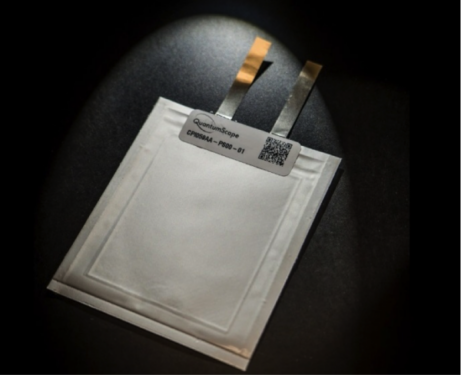Jagdeep Singh, CEO of 10-year old startup QuantumScape, claims the company has solved the battery problems hindering the adoption of electric vehicles with a product that is “ready for commercial deployment.” If successful, this development will make range anxiety and safety concerns with lithium-ion batteries a thing of the past.
The company has created a ceramic solid-state separator thinner than a human hair, which is suitable for fast charging. The separator is nonflammable, noncombustible and resists dendrite growth when current density is applied at practical levels. Many dozens of single-layer pouch cells, 70mm x 85mm, manufactured from these will be assembled in a stack to form a battery.
So far, a batch of cells has been produced that demonstrate battery life in excess of 800 cycles (equating to 240,000 miles) while retaining more than 80% of the original energy capacity when recharged in 15 minutes. The batteries are also capable of operating in temperatures as low as -30°C. When the cell temperature was raised to 180°C, the melting point of lithium, the solid-state separator exhibited no appreciable reaction with the molten lithium metal, showing instead a small endothermic reaction.
If the metallic lithium technology performs as well in production as it has in laboratory testing an ultra-fast two-minute charge could be feasible. The data presented by Singh showed that in testing the battery could be charged at 25C rate (>100mA/cm2), which is a two-minute charge, without suffering damage.
Due to a simpler anode-free design the cells are easier to manufacture and will cost less to produce than conventional lithium-ion cells that use flammable liquid electrolyte and graphite/silicon anodes.
Dr Stanley Whittingham, who won the Nobel Prize for his work on lithium-ion chemistry, has endorsed the technology, saying he was very encouraged by what he had seen in the last few days at QuantumScape. He went on to say QuantumScape’s lithium-metal technology could increase battery energy density by 50% if not 100%. “This will be a breakthrough for electric vehicles as well as other storage,” Whittingham said. “I have not seen data this good anywhere else. We just have to make the cells bigger and get them into cars.”
QuantumScape has backing from Breakthrough Energy Ventures, an investment fund spearheaded by Bill Gates, and Volkswagen, which is committing more than $300 million (as reported by BEST) to the 10-year-old startup and has set up a joint venture to produce solid-state battery cells for its cars by 2025.
“Those kind of energy density, power density and charge rates unlock a host of other applications currently been waiting in the wings for the proper sufficient performance metrics. Electric aviation starts to look a whole lot more attractive and viable when you have this kind of energy density and power,” said J.B. Straubel, chief executive of Redwood Materials and co-founder of Tesla Inc.
There are still challenges that QuantumScape must address before its batteries make it out of the lab and into a car. “I don’t want to trivialise the work that remains,” says Singh. “But it’s not a question of whether this will work or not. It’s a question of engineering.”












